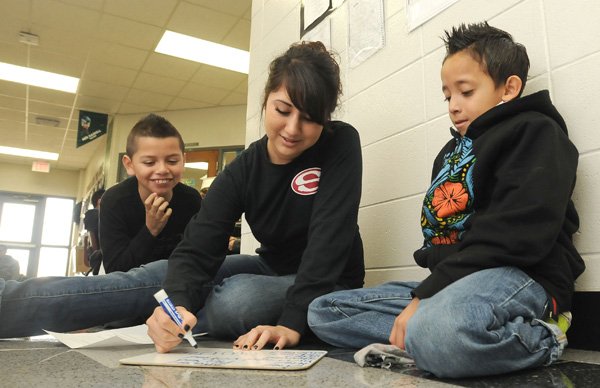SPRINGDALE — Four high school students and six elementary students sat around a table playing shape bingo Friday morning in the hallway of Springdale’s George Elementary.
At A Glance
Credit For Service
Arkansas legislation passed in 1993 allows a secondary student who has completed at least 75 hours of documented community service learning, as certified by the service organization to the school, to be eligible to receive one academic credit that may be applied toward graduation.
Source: Staff Report
“Green trapezoid,” called out one high school student.
A few feet away, Hope Wages, a Springdale High sophomore, sat on the floor with a fourth-grade girl, who was doing a word exercise.
Down the hall, sophomore Lauren Lamaestra and junior Callie Bolain administered a game involving multiplication flash cards for three George students. Then they moved on to practicing for a spelling test.
Delta, a Springdale High community service club of sophomores and juniors, has made weekly trips to George Elementary since September to work with and mentor some third- through fifth-graders, either one-on-one or in small groups.
The high school students arrive at George about 8 a.m. each Friday morning and spend an hour with the younger students, most of whom need help with reading, spelling and math. About 68 percent of George students are classified as English language learners.
“I really like kids,” Lamaestra said. “Being able to help them out, it makes you feel good about yourself.”
John Hunter, a junior, is a former George Elementary student who’s now in his second year with Delta. He’s met with the same group of four third-graders since September, working on various academic subjects.
“It’s mostly about leadership and helping other people out,” Hunter said about Delta.
Raquel Morris, a fifth-grade teacher at George, said the elementary students benefit from the relationships they form with the high school kids.
Delta’s work goes beyond the elementary schools. Students also have done clothing and food drives and worked at the Springdale Senior Center.
Delaney Gates, program assistant at the Senior Center, said the center officials appreciate the Delta students.
“They are very positive, upbeat and helpful,” Gates wrote in an email. “They assist us by doing odd jobs such as sweeping off the sidewalks and cleaning our transportation vans.”
She said some of the seniors don’t have relatives, so the chance to interact with young people is great for them.
“And, the students know that whenever they’re here, they’re walking into a building which is filled with grandparent-esque figures who care about them, so the program is truly extremely beneficial to both parties,” Gates wrote.
Joe Rollins, an assistant principal at Springdale High, organized Delta two years ago. Since then, membership has grown from six to about 60. Students chose the group’s name, a reference to the Greek letter that’s also a math symbol used to represent change.
Unlike most extracurricular clubs, Delta is open only to students who have been referred to and endorsed by teachers or students in the club. They must demonstrate caring for others and be good ambassadors for the school, Rollins said.
Rollins continues to facilitate the group. He even drives the school bus that transports Delta students to George Elementary every Friday. He’s quick to note, however, the students are the ones responsible for choosing their service projects.
“That’s what I’m most proud of,” he said.
“It’s easy to say we have quality students. I wanted to show it to the community. These kids really want to serve. They truly have servants’ hearts,” Rollins said.
After one more week working at George, Delta members will move on and do the same kind of work at Tyson Middle School.
Classes, Clubs Promote Service
High schools across Northwest Arkansas are finding ways to encourage their students to give back. Some schools offer classes where students get credit for the community service work they do.
Connie Crisp leads two such classes at Fayetteville High School.
“It’s a way for kids to understand what’s out there for them, and to learn what their passions and talents are, and what they aren’t,” Crisp said. “That’s the beauty of service learning.”
Her students spent time working at places such as Head Start, the public library, an animal shelter and a nursing home. They then spend time in the classroom doing “reflection pieces” in which they communicate what they’ve learned about the community’s needs — sometimes through words, sometimes through art, Crisp said.
They also take the lead in promoting proper recycling procedures and making sure people understand the importance of recycling.
Service-learning students must come up with and execute a project each semester that addresses some kind of need, ranging from the school level to the international level.
Local high schools also offer numerous extracurricular clubs focused on community service.
Bentonville High School, for example, has at least six clubs that focus primarily on community service activities, ranging from the Arkansas Children’s Hospital Club to Hearts for the Humane Society.
Rogers Heritage High School doesn’t offer a community service class, but it does have about 30 clubs, each of which has a community service component written into their constitutions, according to Brig Caldwell, student relations coordinator and community liaison at the school.
Caldwell is working on a one-stop database for students to learn about all the volunteer opportunities available across the community.
Some students are required to complete community service after running into trouble with the law; others want the experience to boost their chances of getting into college, Caldwell said.
Either way, volunteering “gives students a nonacademic environment to learn real-world tools and learn more about their fellow students,” he said.

